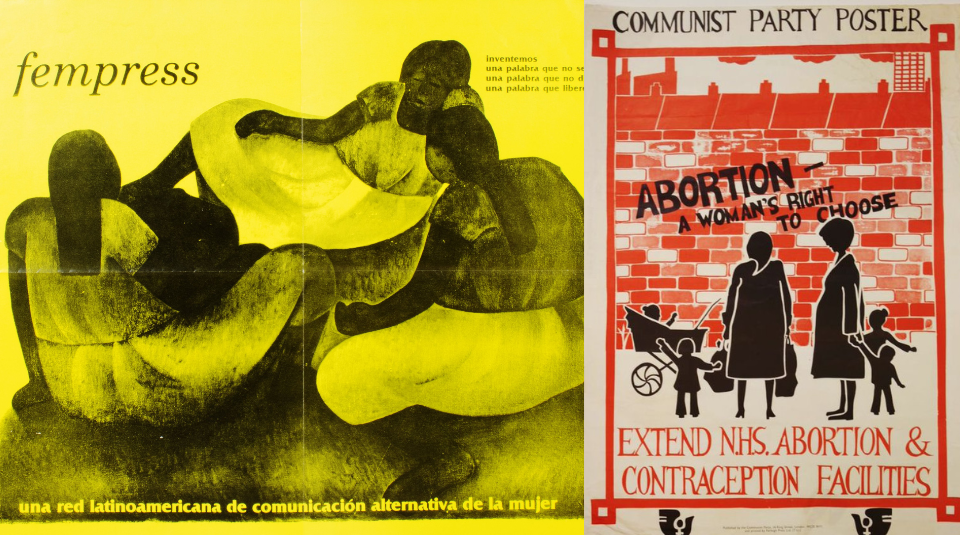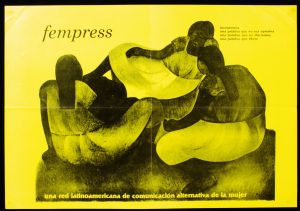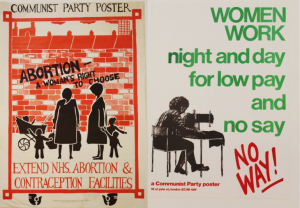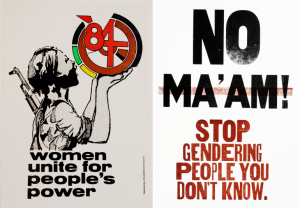
In celebration of International Women’s Day 2023, People’s History Museum’s (PHM) Collections Officer Shivaya Prasad selects campaign materials for women’s rights from our collection of almost three thousand posters. These distinctive posters use bold slogans and illustrations to campaign for issues such as female liberation and bodily autonomy.
International Women’s Day (IWD) is a holiday celebrated every year on March 8 to recognise the social, economic, cultural and political achievements of women. It is also an opportunity to call for the liberation of women, gender equality, reproductive rights and increased autonomy. IWD has been observed since the early twentieth century – its origins lie in the socialist labour and women’s suffrage movements. The Socialist Party of America declared the first National Women’s Day in 1909 to honour women who participated in the New York shirtwaist strike of 1909. After women gained suffrage in Soviet Russia in 1917, IWD was made a national holiday on 8 March. Other feminist movements around the world became synonymous with IWD, such as the ‘The Third World Women’s Alliance’ which was a revolutionary women of colour collective founded in 1968.
International Women’s Day has always had socialist and communist origins, but became more mainstream when it was first celebrated by the United Nations in 1975.
This blog will explore IWD, female liberation, bodily autonomy and women’s rights movements through the lens of posters in PHM’s collection.

Fempress was a Latin American Media Network started by two Chilean women exiled to Mexico in 1981. The network published a monthly magazine, operated a press service for women’s issues, and provided a radio press service covering Latin America.
This poster shows three Chilean women sitting together on the ground. Beneath reads “Una red latinoamericana de comunicación alternativa de la mujer” (a Latin American network of alternative communication for women). In the top right of the poster reads “Inventemos una palabra que no sea opresiva una palabra que no discrimine una palabra que libere.” This translates to “Let’s invent a word that is not oppressive, a word that does not discriminate, a word that liberates.”
In Chile, a 17-year dictatorship began under Augusto Pinochet in 1973 after a US backed military coup overthrew the previous government. His dictatorship promoted patriarchal values, traditional family structures and marginalisation of women. Feminist coalitions, federations, and grassroots organisations mobilised against Pinochet’s patriarchal dictatorship. Feminist movements in Chile continue to grow against patriarchy, social injustice and gender inequality. Chile’s International Women’s Day protest in March 2020 was significant, with over a million women joining the protest.

This Communist Party of Great Britain (CPGB) poster (above left), produced in 1974, advocates for extended abortion rights and contraception facilities. There is an emphasis on the woman’s right to choose and bodily agency. This poster highlights the historic fight for abortion rights. Sexual and reproductive rights are under continual threat, despite abortion being a medical procedure, a human right and a basic healthcare need. Barriers to abortions have been gradually eased – over the last 30 years more than 50 countries have increased access to abortion.
Nevertheless, the World Health Organisation (WHO) estimate that 25 million unsafe abortions take place each year due to restrictions, stigma and criminalisation. Some countries, such as Nicaragua and El Salvador maintain laws that ban abortions. According to the WHO, ‘across the globe, 40% of women of childbearing age live in countries with highly restrictive abortion laws, or where abortion is legal, is neither available or accessible.’
With the reversal of Roe vs. Wade in 2022, abortion rights are not legally protected in the United States. The fight for bodily autonomy is ongoing. The Abortion Act of 1967 legalised abortion in England, Scotland and Wales. In 2019, abortion was decriminalised in Northern Ireland, but commissioned abortion services are still not established, and there are still many barriers to accessing abortion, particularly to working class and rural women. Despite abortion being accessible in the UK, its actual legal status is contentious.
Women also continue to face entrenched gender inequalities in the workplace. This CPGB poster (above right) is about the poor conditions, pay and status women are given in the workplace. Women have played an important role in the trade union movement. The poster also refers to the expectations of women’s labour in all facets of her life. During the pandemic, women were more likely to be key frontline workers, and had to take on a disproportionate burden of work domestically in the home. Women also face multiple forms of discrimination, with Black, Asian and other ethnic minorities facing higher unemployment, and disparities in pay. Disabled women are often excluded from the labour market. The gender pay gap is at 15.3% and violence and sexual harassment against women in the workplace persists.

Women played a significant role in the Anti-Apartheid movement. As Black women in apartheid South Africa, they faced racial, social and sexual oppression. The above left poster is an African National Congress (ANC) poster about women’s movements for power and autonomy in South Africa. When the ANC formed in 1912, it did not accept women as members.
There were many different campaigning groups throughout South Africa, as well Zimbabwe and Namibia. Some of their work included boycott campaigns, mobilising funds and campaigns to free female political prisoners, and working towards roles in policy-making. A notable part of their resistance movements were the protests against pass laws, which forced Black Africans to carry documents allowing them to be in white-occupied areas. The African National Congress Women’s league (ANCWL) formed in 1943.
The final poster (above right) is about gender identity and gender labels. It was created by ‘Black Shell Press’ – their description for the poster reads, “Queer and trans people are everywhere. Words ‘sir’, ‘ma’am’ and ‘miss’ etc. may seem polite but being misgendered by a stranger is hurtful. You don’t need to assign gender to say hello!”
Within a patriarchal system, women and other marginalised groups suffer. This includes non-binary people, transgender people and others who do not identify as their assigned gender at birth. This also includes other intersections of identity, such as race and sexuality. Inclusivity and freedom is important for gender equality and equity. Raising awareness and highlighting injustice regarding gender is important, as is making the gender movement more inclusive. Labels such as ‘Ma’am’ can also be seen as outdated, sexist, and unnecessarily gendered.
To break stereotypes, bias and preconceptions regarding gender, we can understand and listen to different stories and histories of marginalised and oppressed groups.
Explore more of PHM’s poster collection in previous blogs about Black people’s resistance movements and protest amongst the South Asian diaspora.
Another key moment in the women’s rights movement was the fight for women’s suffrage. See the Manchester suffragette banner in Main Gallery One from Wednesday 21 June 2023.
Revisit the 2017 Women’s Marches in our blog From a march to a museum.
In the museum’s archive, see documents from the Labour Party on the Abortion Acts, material from the Chile Solidarity Campaign collection and the Judith Hart papers. There are items from the Standing Joint Committee on Working Women’s Industrial Organisation looking at women’s role in work and Anti-Apartheid movement papers including Anti-Apartheid News.
People’s History Museum is open from 10.00am to 5.00pm, every day except Tuesday. The archive is open Wednesday to Friday, 10.00am until 4.00pm (lunchtime closure 12.30pm to 1.30pm). Booking essential.